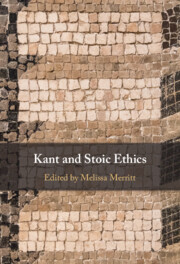Refine search
Actions for selected content:
24 results
Chapter 6 - The Kantian Solution
- from Part II - Kantian Theodicy
-
- Book:
- Reason and the Good in Leibniz, Kant and Hegel
- Published online:
- 06 February 2026
- Print publication:
- 12 March 2026, pp 121-145
-
- Chapter
- Export citation
Chapter 5 - The Kantian Puzzle
- from Part II - Kantian Theodicy
-
- Book:
- Reason and the Good in Leibniz, Kant and Hegel
- Published online:
- 06 February 2026
- Print publication:
- 12 March 2026, pp 96-120
-
- Chapter
- Export citation
Chapter X - What Kant Should Have Said
-
- Book:
- Kant and the Supposed Right to Lie
- Published online:
- 18 July 2025
- Print publication:
- 28 August 2025, pp 175-188
-
- Chapter
- Export citation
Chapter 9 - Living in Accordance with Nature
- from Part II - Virtue and Eudaimonia
-
-
- Book:
- Kant and Stoic Ethics
- Published online:
- 18 July 2025
- Print publication:
- 07 August 2025, pp 151-170
-
- Chapter
- Export citation
Chapter 7 - Kant’s Rejection of Stoic Eudaimonism
- from Part II - Virtue and Eudaimonia
-
-
- Book:
- Kant and Stoic Ethics
- Published online:
- 18 July 2025
- Print publication:
- 07 August 2025, pp 120-136
-
- Chapter
- Export citation

Kant and Stoic Ethics
-
- Published online:
- 18 July 2025
- Print publication:
- 07 August 2025
Attainability and Kant’s Moral Argument
-
- Journal:
- Kantian Review , First View
- Published online by Cambridge University Press:
- 14 July 2025, pp. 1-18
-
- Article
-
- You have access
- Open access
- HTML
- Export citation
Kant on the ‘Wise Adaptation’ of Our Cognitive Faculties: The Limits of Knowledge and the Possibility of the Highest Good
-
- Journal:
- Kantian Review / Volume 30 / Issue 2 / June 2025
- Published online by Cambridge University Press:
- 16 December 2024, pp. 259-279
- Print publication:
- June 2025
-
- Article
- Export citation
1 - Christian Wolff
- from Part I - Pre-Kantian Moral Philosophy
-
- Book:
- Kant's <i>Critique of Practical Reason</i>
- Published online:
- 31 January 2025
- Print publication:
- 28 March 2024, pp 13-17
-
- Chapter
- Export citation
11 - Hermann Andreas Pistorius
- from Part III - The Reception of the Critique of Practical Reason
-
- Book:
- Kant's <i>Critique of Practical Reason</i>
- Published online:
- 31 January 2025
- Print publication:
- 28 March 2024, pp 255-256
-
- Chapter
- Export citation
The Postulate of Immortality in the Critique of Practical Reason (and Beyond)
-
- Journal:
- Kantian Review / Volume 29 / Issue 1 / March 2024
- Published online by Cambridge University Press:
- 26 January 2024, pp. 19-38
- Print publication:
- March 2024
-
- Article
-
- You have access
- HTML
- Export citation
6 - The Life in Accordance with Nature
-
- Book:
- Augustine on the Nature of Virtue and Sin
- Published online:
- 10 January 2024
- Print publication:
- 23 November 2023, pp 207-239
-
- Chapter
- Export citation
4 - Augustine’s Definitions of Virtue
-
- Book:
- Augustine on the Nature of Virtue and Sin
- Published online:
- 10 January 2024
- Print publication:
- 23 November 2023, pp 119-162
-
- Chapter
- Export citation
The Predicament of Practical Reason
-
- Journal:
- Kantian Review / Volume 28 / Issue 3 / September 2023
- Published online by Cambridge University Press:
- 02 October 2023, pp. 459-466
- Print publication:
- September 2023
-
- Article
-
- You have access
- Open access
- HTML
- Export citation
Chapter 7 - The Positive Side of the Critique of Pure Reason
- from Part III - The Method of the Critique of Pure Reason
-
- Book:
- Kant's <I>Critique of Pure Reason</I> and the Method of Metaphysics
- Published online:
- 11 May 2023
- Print publication:
- 25 May 2023, pp 207-228
-
- Chapter
- Export citation
1 - The Original Empty Formalism Objection
-
-
- Book:
- Practical Philosophy from Kant to Hegel
- Published online:
- 16 March 2021
- Print publication:
- 18 March 2021, pp 10-27
-
- Chapter
- Export citation
2 - Moral Faith in God
-
- Book:
- Kant and Religion
- Published online:
- 08 May 2020
- Print publication:
- 28 May 2020, pp 27-60
-
- Chapter
- Export citation
7 - The Ethical Community and the Church
-
- Book:
- Kant and Religion
- Published online:
- 08 May 2020
- Print publication:
- 28 May 2020, pp 164-184
-
- Chapter
- Export citation
Kant’s Doctrine of the Highest Good: A Theologico-Political Interpretation
-
- Journal:
- Kantian Review / Volume 25 / Issue 2 / June 2020
- Published online by Cambridge University Press:
- 30 April 2020, pp. 193-217
- Print publication:
- June 2020
-
- Article
- Export citation
Kant on the Role of Religion for Moral Progress
-
- Journal:
- Kantian Review / Volume 24 / Issue 3 / September 2019
- Published online by Cambridge University Press:
- 09 August 2019, pp. 335-357
- Print publication:
- September 2019
-
- Article
- Export citation
